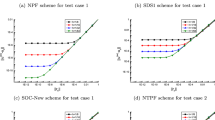Abstract
Sixth-order compact difference schemes for Poisson equations have been widely investigated in the literature. Nevertheless, those methods are all constructed based on knowing the exact values of the derivatives of the source term. Therefore, this drawback mostly prevents their actual applications as the analytic form of the source term is rarely available. In this paper, we propose a sixth-order quasi-compact difference method, without having to know the derivatives of the source term, for solving the 2D and 3D Poisson equations. Our strategy is to discretize the equation by the fourth-order compact scheme at the improper interior grid points that adjoin the boundary, while the sixth-order scheme, where it is compact only for the unknowns, is exploited to the proper interior grid points that are not adjoining the boundary. Theoretically, we rigorously prove that the proposed method can achieve the global sixth-order accuracy. Since there are no derivatives of the source term involved in the proposed scheme, our global sixth-order quasi-compact difference method can be developed to solve the time-dependent problems using a time advancing scheme. Numerical experiments are carried out to demonstrate the convergence order and the efficiency of the proposed methods.


Similar content being viewed by others
Data Availibility
Enquiries about data availability should be directed to the authors.
References
Karniadakis, G., Israeli, M., Orszag, S.: High-order splitting methods for the incompressible Navier-Stokes equations. J. Comput. Phys. 97, 414–443 (1991)
Golub, G., Huang, L., Simon, H., Tang, W.: A fast Poisson solver for the finite difference solution of the incompressible Navier-Stokes equations. SIAM J. Sci. Comput. 19, 1606–1624 (1998)
Gupta, M.M., Kouatchou, J., Zhang, J.: Comparison of second- and fourth-order discretizations for multigrid Poisson solvers. J. Comput. Phys. 132, 226–232 (1997)
Zhang, J.: Fast and high accuracy multigrid solution of the three dimensional Poisson equation. J. Comput. Phys. 143, 449–461 (1998)
Zhang, J.: Multigrid method and fourth-order compact scheme for 2D Poisson equation with unequal mesh-size discretization. J. Comput. Phys. 179, 170–179 (2002)
Kwon, Y., Stephenson, J.W.: Single cell finite difference approximations for Poisson’s equation in three variables. Appl. Math. Notes. 2, 13–20 (1982)
Wang, J., Zhong, W., Zhang, J.: A general meshsize fourth-order compact difference discretization scheme for 3D Poisson equation. Appl. Math. Comput. 183, 804–812 (2006)
Ge, Y.: Multigrid method and fourth-order compact difference discretization scheme with unequal meshsizes for 3D Poisson equation. J. Comput. Phys. 229, 6381–6391 (2010)
Wang, H., Zhang, Y., Ma, X., Qiua, J., Liang, Y.: An efficient implementation of fourth-order compact finite difference scheme for Poisson equation with Dirichlet boundary conditions. Comput. Math. Appl. 71, 1843–1860 (2016)
Spotz, W.F., Carey, G.F.: A high-order compact formulation for the 3D Poisson equation. Numer. Meth. Part Differ. Equ. 12, 235–243 (1996)
Zhai, S., Feng, X., He, Y.: A family of fourth-order and sixth-order compact difference schemes for the three-dimensional Poisson equation. J. Sci. Comput. 54, 97–120 (2013)
Zhai, S., Feng, X., He, Y.: A new method to deduce high-order compact difference schemes for two-dimensional Poisson equation. Appl. Math. Comput. 230, 9–26 (2014)
Sutmann, G., Steffen, B.: High-order compact solvers for the three-dimensional Poisson equation. J. Comput. Appl. Math. 187, 142–170 (2006)
Saldanha, G.: Single cell high order difference schemes for Poisson’s equation in three variables. Appl. Math. Comput. 186, 548–557 (2007)
Dai, R., Lin, P., Zhang, J.: An efficient sixth-order solution for anisotropic Poisson equation with completed Richardson extrapolation and multiscale multigrid method. Comput. Math. Appl. 73, 1865–1877 (2017)
Dai, R., Lin, P., Zhang, J.: An EXCMG accelerated multiscale multigrid computation for 3D Poisson equation. Comput. Math. Appl. 77, 2051–2060 (2019)
Uh Zapata, M., Itzá Balam, R.: High-order implicit finite difference schemes for the two-dimensional Poisson equation. Appl. Math. Comput. 309, 222–244 (2017)
Feng, H., Zhao, S.: FFT-based high order central difference schemes for three-dimensional Poisson’s equation with various types of boundary conditions. J. Comput. Phys. 410, 109391 (2020)
Feng, H., Long, G., Zhao, S.: FFT-based high order central difference schemes for Poisson’s equation with staggered boundaries. J. Sci. Comput. 86, 7 (2021)
Ren, Y., Feng, H., Zhao, S.: A FFT accelerated high order finite difference method for elliptic boundary value problems over irregular domains. J. Comput. Phys. 448, 110762 (2022)
Spotz, W.F.: High-order compact scheme for computational mechanics. Presented to the faculty of the graduate school of the university of Texas at Austin in Partial Fulfillment of the requirments for the degree of Doctor of philosophy (1995)
Nabavi, M., Siddiqui, M.K., Dargahi, J.: A new 9-point sixth-order accurate compact finite-difference method for the Helmholtz equation. J. Sound Vibr. 307, 972–982 (2007)
Sutmann, G.: Compact finite difference schemes of sixth order for the Helmholtz equation. J. Comput. Appl. Math. 203, 15–31 (2007)
Liao, H.L., Sun, Z.Z., Shi, H.S.: Error estimate of fourth-order compact scheme for linear Schrödinger equations. SIAM J. Numer. Anal. 47, 4381–4401 (2010)
Püschel, M., Moura, J.M.: The algebraic approach to the discrete cosine and sine transforms and their fast algorithms. SIAM J. Comput. 32, 1280–1316 (2003)
Acknowledgements
The authors are grateful to the anonymous referees for their constructive comments which benefit this paper a lot. The third author (corresponding author) Hai-Wei Sun is supported by Science and Technology Development Fund of Macao SAR (Grant No. 0122/2020/A3) and MYRG2020-00224-FST from University of Macau, and the fourth author Chengjian Zhang is supported by NSFC (Grant No. 11971010).
Funding
The authors have not disclosed any funding.
Author information
Authors and Affiliations
Corresponding author
Additional information
Publisher's Note
Springer Nature remains neutral with regard to jurisdictional claims in published maps and institutional affiliations.
Appendices
Appendix 1: Details for Poisson Equations
1.1 2D Poisson Equation
For simplify, for \(\varphi \in \{U,f\}\), we introduce notations as follows:
Then the QCD scheme (2.25) for 2D Poisson problem (2.1) can be stated as following pointwise format:
in which \(U_{i,j}\) is the approximation of the exact solution for 2D Poisson problem (2.1) in \((x_i,y_j)\), \(f_{i,j}:=f(x_i,y_j)\) and \(g_{i,j}:=g(x_i,y_j)\); the compact difference operator \({\mathscr {L}}_{2,h}\) for \(U_{i,j}\) is given by
and difference operator \({\mathscr {H}}_{2,h}\) for source term \(f_{i,j}\) is expressed as
1.2 3D Poisson Equation
For \(\varphi \in \{U,f\}\), introducing new notations as follows:
Then the QCD scheme (2.37) for 3D Poisson problem (2.26) can be stated as following pointwise format:
in which \(U_{i,j,l}\) is the approximation of the exact solution for 3D Poisson problem (2.26) in \((x_i,y_j,z_l)\), \(f_{i,j,l}:=f(x_i,y_j,z_l)\) and \(g_{i,j,l}:=g(x_i,y_j,z_l)\); the compact difference operator \({\mathscr {L}}_{3,h}\) for \(U_{i,j,l}\) is given by
and the difference operator \({\mathscr {H}}_{3,h}\) for source term \(f_{i,j,l}\) is expressed as
Appendix 2: Details for Helmholtz Equations
1.1 2D Helmholtz Equation
Combining the notations (6.1), the QCD scheme (4.7) for 2D Helmholtz equation can be presented as the following pointwise format:
in which \(U_{i,j}\) is the approximation of the exact solution for 2D Helmholtz problem (4.14) in \((x_i,y_j)\), \(f_{i,j}:=f(x_i,y_j)\) and \(g_{i,j}:=g(x_i,y_j)\); the compact difference operator \({\mathscr {L}}_{2,h,\lambda }\) for \(U_{i,j}\) is given by
and the difference operator \({\mathscr {H}}_{2,h,\lambda }\) for source term \(f_{i,j}\) is expressed as
1.2 3D Helmholtz Equation
Using the notations (6.4), the QCD scheme (4.13) for 3D Helmholtz problem (4.1) can be rewritten as the following pointwise format:
in which \(U_{i,j,l}\) is the approximation of the exact solution of 3D Helmholtz equation in \((x_i,y_j,z_l)\), \(f_{i,j,l}:=f(x_i,y_j,z_l)\) and \(g_{i,j,l}:=g(x_i,y_j,z_l)\); the compact difference operator \({\mathscr {L}}_{3,h,\lambda }\) for \(U_{i,j,l}\) is given by
and the difference operator \({\mathscr {H}}_{3,h,\lambda }\) for source term \(f_{i,j,l}\) is expressed as
Rights and permissions
Springer Nature or its licensor holds exclusive rights to this article under a publishing agreement with the author(s) or other rightsholder(s); author self-archiving of the accepted manuscript version of this article is solely governed by the terms of such publishing agreement and applicable law.
About this article
Cite this article
Sun, T., Wang, Z., Sun, HW. et al. A Sixth-Order Quasi-Compact Difference Scheme for Multidimensional Poisson Equations Without Derivatives of Source Term. J Sci Comput 93, 45 (2022). https://doi.org/10.1007/s10915-022-02003-6
Received:
Revised:
Accepted:
Published:
DOI: https://doi.org/10.1007/s10915-022-02003-6
Keywords
- Poisson equations
- Discrete maximum principle
- Quasi-compact difference scheme
- Global sixth-order accuracy




